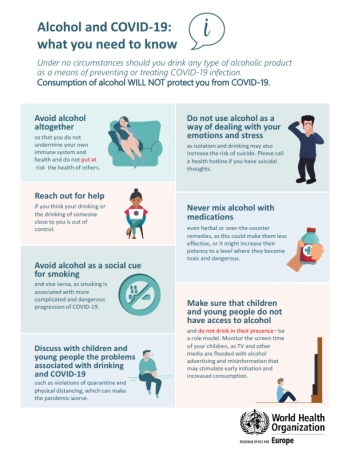 Alcohol is known to be harmful to health in general, and well understood to increase the risk of violence, including intimate partner violence, injury and alcohol poisoning. At times of lockdowns during the COVID-19 pandemic, alcohol consumption can exacerbate health vulnerability, risk-taking behaviours, mental health issues and violence. The WHO Regional Office for the Eastern Mediterranean reminds people that drinking alcohol does not protect them from COVID-19, and encourages governments to ensure implementation of a ban and/or reinforce regulations to limit alcohol availability during the pandemic.
Alcohol is known to be harmful to health in general, and well understood to increase the risk of violence, including intimate partner violence, injury and alcohol poisoning. At times of lockdowns during the COVID-19 pandemic, alcohol consumption can exacerbate health vulnerability, risk-taking behaviours, mental health issues and violence. The WHO Regional Office for the Eastern Mediterranean reminds people that drinking alcohol does not protect them from COVID-19, and encourages governments to ensure implementation of a ban and/or reinforce regulations to limit alcohol availability during the pandemic.
Busting myths on alcohol and COVID-19
As part of its public health response to COVID-19, WHO has worked with partners to develop guidance, which addresses myths and provides guidance during the pandemic.
Alcohol and COVID-19: what you need to know
Alcohol is a psychoactive substance that is associated with mental disorders. People at risk or who have an alcohol-use disorder, are particularly vulnerable, especially when in self-isolation. Medical and treatment services need to be alert, watchful and ready to respond to any person in need.
Fear and misinformation have generated a dangerous myth that consuming high strength alcohol can kill the COVID-19 virus. It does not. Consuming any alcohol poses health risks, but consuming high strength ethyl alcohol (ethanol), particularly if it has been adulterated with methanol, can result in severe health consequences including death.
Alcohol consumption is associated with a range of communicable, noncommunicable and mental health disorders, which can render a person vulnerable to a number of diseases including COVID-19. In particular, alcohol compromises the body’s immune system and increases the risk of adverse health outcomes. Therefore, people should minimise their alcohol consumption at any time, particularly during the COVID-19 pandemic.
Restricting alcohol access during the COVID-19 pandemic
Alcohol is responsible for a total of three million deaths worldwide, one third of which occur in the WHO European Region. Although a vast majority of the population in the countries of the Eastern Mediterranean Region is abstinent and per capita consumption of alcohol is about one tenth of the global consumption, the need is to uphold and even reinforce existing rules and regulations to protect health and reduce harm caused by alcohol, such as restricting access during the COVID-19 pandemic and emergency situations; while any relaxation of regulations or their enforcement should be avoided.
This needs to be complemented by communicating with the public about the risks of alcohol consumption and maintaining and strengthening alcohol and drug treatment services.
Infographic on alcohol and COVID-19: what you need to know
Summary on alcohol and COVID-19: what you need to know
Factsheet on alcohol and COVID-19: what you need to know


